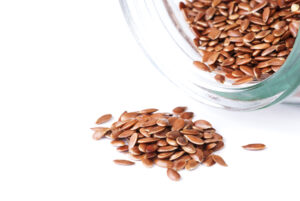 Flaxseed, also known as linseed, is a high fiber food that has been cultivated for thousands of years around the world. One of the main benefits of flaxseed is that its a rich source of the healthiest type of fat, known as omega 3 fatty acid.
Flaxseed, also known as linseed, is a high fiber food that has been cultivated for thousands of years around the world. One of the main benefits of flaxseed is that its a rich source of the healthiest type of fat, known as omega 3 fatty acid.
This group of healthy fats also includes salmon, walnuts, chia seeds and sardines. Flax is a also complete protein source, containing all nine of the essential amino acids.
Research is showing that the benefits of flaxseed include preventing menopause hot flashes, lowering cholesterol, improving heart health and benefiting blood sugar levels. It also improves breast and prostate health and is known to be an effective laxative which helps with constipation by adding fiber and bulk to the intestines.
Flaxseed has been proven to have a dual effectiveness for both constipation and diarrhea. This study on flaxseed comes from the Natural Products Research Division of a Medical College in Pakistan. Flaxseed oil and its gel-like fiber was given orally to people and it caused a dose-dependent increase in looser bowel movements – meaning that the higher the dose, the more effective it was. The study also showed flaxseed helpful for people with diarrhea.
Mayo Clinic breast health specialist Sandhya Pruthi, M.D., recently conducted a study on crushed flaxseed for hot flashes and menopause symptoms. The women were given six weeks of flaxseed therapy, consisting of 40 grams (one and a half ounces) of crushed flaxseed eaten daily. Study participants were asked questions that were translated into their individual hot flash scores.
The result was that their frequency of hot flashes decreased by fifty percent. Participants also reported good improvements in mood, joint and muscle pain, chills, and sweating. This was a significant benefit to their health and quality of life. Dr. Pruthi said: “We are quite pleased with the improvements noted by these women in their quality of life. Not only does flaxseed seem to alleviate hot flashes, but it appears to have overall health benefits as well.”
Flaxseed may provide a way for men with high cholesterol to lower it without using drugs. The Iowa State University Nutrition and Wellness Research Center recently studied ground flaxseed for this purpose and found that it decreased cholesterol in men by around ten percent over the three month study. The men ate three tablespoons of flaxseed daily.
Flaxseed was recently studied for the improvement of blood sugar levels in a study from the “Nutrition Research” journal. In this study, overweight men and postmenopausal women who had pre-diabetes consumed ground flaxseed daily for 12 weeks. This resulted in decreased glucose and insulin levels and also an improved insulin sensitivity in the participants. Having a better insulin sensitivity is healthier as this allows the body to utilize sugar in the blood more effectively.
Flaxseeds are available as whole seeds, ground seeds and flax seed oil. The ground seeds may be the healthiest option as they contain the most protein and fiber. Flaxseeds blend well into many foods, such as smoothies, hot and cold cereals, can be sprinkled on salads or hot vegetables, and even used in home-baked goods like muffins. The seeds are best stored in the refrigerator to preserve their benefits. Most of the studies on flaxseed used one tablespoon per day.
This health news is shared by Nutrition Breakthroughs, a provider of nutrition articles and effective natural remedies since 2001. Nutrition Breakthroughs makes the original calcium and magnesium based sleep aid Sleep Minerals II. Besides being an effective insomnia remedy, Sleep Minerals II is also beneficial for women with menopause symptoms such as hot flashes or night sweats.
Anita L. of New Caney, Texas says: “I was having hot flashes every 30 minutes to an hour through the night and was so miserable. After about two weeks of taking the Sleep Minerals, I noticed an incredible difference with my sleep. I have much less interruption from flashes, I’m sleeping much better and I’m a lot more comfortable.”
For more information, visit the Sleep Minerals II page.
Research is showing that the benefits of flaxseed include preventing menopause hot flashes, lowering cholesterol, improving heart health and benefiting blood sugar levels. It also improves breast and prostate health.
Flaxseed has a very high amount of omega-3 fatty acids – a high quality type of fat that our body is unable to make on its own. Omega-3 fats can improve the health of the heart, brain, eyes, liver, joints and skin. Flaxseed is also a rich source of fiber, making it an excellent aid to digestion.
Flaxseed has been proven to have a dual effectiveness for both constipation and diarrhea. In one study, flaxseed oil and its gel-like fiber was given orally to people and it caused a dose-dependent increase in looser bowel movements – meaning that the higher the dose, the more effective it was.



